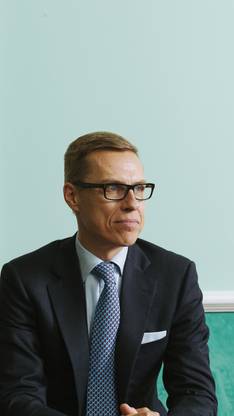The interview series 2014/15 part 02 / Helsinki
The interview series 2014/15 part 02
Navigating ‘Boat Finland’ through troubled waters and a forthcoming election next April are top of the agenda for the leader of a country increasingly having to keep an eye on noisy neighbour Russia.

Alexander Stubb
Prime minister, Finland
Alexander Stubb rushes into his office in Helsinki’s neoclassical Government Palace, grabs his suit jacket from the back of a chair and asks his assistant to find him a banana. Stubb, who became the head of Finland’s centre-right National Coalition party and the country’s prime minister in June when his predecessor unexpectedly stepped down, is a busy man. The economy is struggling, Finland’s neighbour, Russia, is causing problems while Stubb’s own political coalition is under threat from the populist right-wing Finns party.
No wonder then that Stubb needs the odd banana to stay focused. But if you thought that was his lunch, you’re mistaken. The prime minister would never skip lunch and also lives by the credo: “One hour of exercise equals two hours of extra energy.” But Stubb, who speaks five languages fluently also seems to have another motto and it goes something like: “We have to be able to talk about it.” His solution to most problems, be it Russia, the economy or the Finns party, starts with communication and open dialogue.
Monocle: Given the recent incidents in the Baltic Sea and in Finland’s air space, are you more worried about Russia now?
Alexander Stubb: Not after isolated events like this [the alleged intrusion of a Russian submarine into Swedish waters]. The violations of our airspace are naturally regrettable and we have to be able to talk about them openly with the Russians, which we have done. I’m more worried about Russia’s foreign-policy doctrine in general. It’s based on a zero-sum game: if you win, I lose.
M: Does Finland’s position as Russia’s neighbour mean that it needs to be more cautious in its comments than other countries?
AS: No, it doesn’t. Finland is part of the EU. Our relations with Russia are good but Russia’s actions are wrong and we need to be able to say that.
M: But Finland has been criticised for appearing weak in its statements.
AS: Finland’s position has been clear from the start. We’ve condemned Russia for two reasons. The first is that it has conquered an area within a sovereign state, Crimea, and the second is that it has destabilised another area within a sovereign state: eastern Ukraine. And we’ve also backed the only instrument we can use, meaning the sanctions.
M: The possibility of Finland joining Nato has come up again due to these events. Will Finland join Nato within, say, five years?
AS: We’re not preparing for a membership during this mandate period. But I’m sure the discussion will continue.
M: Only a quarter of the population support membership; will the people decide this issue?
AS: Yes. We live in a democracy and can’t make decisions about our foreign and security policies against the people’s will.
M: Sanctions against Russia have a big impact on the Finnish economy; how much are they to blame for the current downturn?
AS: Our economic situation would be easier if the Russian economy was working. But it was already in bad shape before the sanctions; Russia’s economy is still based on oil and gas, and that’s why it’s in trouble. A 3 per cent decline in the Russian economy means a 0.5 per cent decline for Finland because of exports.
M: What are the other main factors for Finland’s problems?
AS: Finland is a very export-dependent country so the global economic downturn has had a big effect on us. The second factor is that our two big industries, the forest and the IT trade, got into trouble around 10 years ago. And thirdly, there’s a structural problem. We’ve over-dimensioned our welfare society. We’ve had six poor years and we’ll have four more but we’ll come back. We need a change in the economic cycle, economic growth, structural reforms and a bit of luck, too.
M: The next elections are in April and polls show the Finns party gaining support. Why is that?
AS: This is a European phenomenon. What’s behind it is a combination of the economic situation and the fact that politics is broken at the moment. People don’t believe in political institutions. Over the years, politics has tried to create an illusion of itself as omnipotent, something that can solve any problem. And people are smart enough to see that it’s not true. In this era of globalisation, when everything should be open and possible, people are turning inwards. The independence referendum in Scotland is an example of that. Globalisation is moving so fast that people are looking for security somewhere else and I think the Finns party is a part of that phenomenon.
M: Are you changing your party’s course in any way in order to win votes?
AS: No. I believe in an open society, in liberal democracy, in a social market economy and internationality. Those are the ingredients that will put Finland back on its feet again. We need more immigration in this country. Their line is the opposite of mine but that doesn’t mean that we can’t have a dialogue.
M: With the elections in April, your term may be a short one. If that’s the case is there anything specific you want to achieve?
AS: At the moment I’m focusing on one thing only: changing the course of “Boat Finland”. First, we must start implementing all the structural and budgetary decisions we’ve taken. The second stage is mapping out a survival strategy for Finland. And the third is getting people to work again, getting the economy growing again and rescuing the Finnish welfare society. We need to restore people’s faith in politics and I can’t promise the Finns more good things; I’m only promising toil, sweat and tears.


